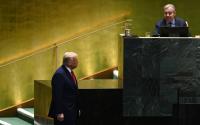Guardian
November 10 2008
Some may express reservations about George Bush's Middle East policies over the past eight years but Tzipi Livni, Israel's foreign minister, is not among them. Speaking during what was probably Condoleezza Rice's farewell visit to the region as US secretary of state, Livni applauded a bilateral relationship "which has been truly strengthened under the leadership and vision of President Bush ... His contribution will never be forgotten".
Livni is absolutely correct, though not perhaps in the sense that she intended. Bush's declaration of a "war on terror" in the wake of the 9/11 attacks fired a confrontation between the western and Muslim worlds unprecedented in modern times. His invasions of Afghanistan and Iraq destabilised the region, caused the deaths of hundreds of thousands of people, and significantly enhanced the influence of Iran, Israel's sworn enemy.
Until quite recently, Bush had largely ignored the Israel-Palestine conflict that many see as the Middle East's central issue. In effect he subordinated US policy to the hardline views of former Israeli prime minister Ariel Sharon. And by refusing to talk to militant Palestinian groups such as Hamas, he helped split the Palestinian movement and perpetuated the peace process impasse. This is indeed an unforgettable contribution.
Yet even Bush's blinkered outlook evolved over time. He eventually went beyond his predecessor, Bill Clinton, in formally supporting the creation of a Palestinian state.
He endorsed a "road map" for peace that remains the basis of current negotiations. And, a year ago this month, he relaunched the peace process in Annapolis, Maryland, securing the backing of Arab leaders.
Bush and Rice now concede their stated aim, always improbable, of reaching a settlement before they leave office in January, is beyond reach. But meeting in the Egyptian resort of Sharm el-Sheikh yesterday, the Middle East Quartet - the US, the UN, the EU and Russia - agreed with Livni and the Palestinian president, Mahmoud Abbas, that the process must continue. A follow-up to Annapolis was pencilled in for Moscow in the spring.
All the same, given the upheaval in Washington as a domestically focused administration prepares for power, and given the interregnum in Israel ahead of February's general election, many are ready to write off Bush's Annapolis initiative altogether. Failure could presage a return to the mutual carnage that marked the first part of the decade.
Speaking to Rice in Ramallah on Friday, Abbas reeled off a list of problems including continuing Israeli settlement activity and settler violence, restrictions on movement in the West Bank, last week's breakdown of the Gaza truce, and the Palestinian Authority's stand-off with Hamas after the weekend postponement of Egyptian-brokered reconciliation talks. All that is in addition to unresolved final-status issues such as borders, Jerusalem and refugees.
Palestinian negotiator Saeb Erekat warned the whole thing could fall apart. "We hope the Quartet will help us so the Israelis will not use this vacuum to increase the settlements, increase the incursions, increase the attacks and the roadblocks on the Palestinian people." Other Palestinians say increased US engagement is serving only to "beautify the occupation".
Yet perhaps, for once, gloom over peace prospects is not wholly justified. It's true Bush never missed an opportunity to miss an opportunity. But in her meetings with Livni, Abbas, and with the Palestinian prime minister, Salam Fayyad, in Jenin, Rice made clear she believed the Obama administration would seek to maintain the past year's meagre momentum through political mediation and economic assistance.
Barack Obama's overall more conciliatory approach to international affairs may justify such optimism - Abbas urged him "not to waste time" and even Khaled Mashaal, the Hamas leader, is suddenly offering to talk to him.
And from her remarks in Jenin it was plain that Rice has become deeply impressed by Palestinian nation-building efforts. Making up for past neglect, the US has given an unprecedented $700m this year to the Palestinian Authority. Rice noted that her presence in Jenin, scene of extraordinary violence during the intifada in 2002, was a measure of progress made.
Livni is also anxious to keep the process alive, especially as a potentially bigger problem - Iran - looms. The Kadima leader believes, probably rightly, that her chances of beating Likud's hardline rejectionist leader, Binyamin Netanyahu, in February's elections depend to a considerable degree on her delineating a viable path to peace.
"Stagnation is not in Israel's interest and it cannot be our policy," Livni said. "We are committed to negotiations with the Palestinians, not as a favour to anyone but to ensure a peaceful and secure future for Israel."






